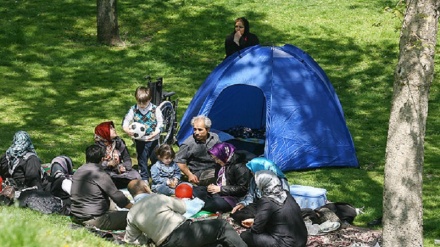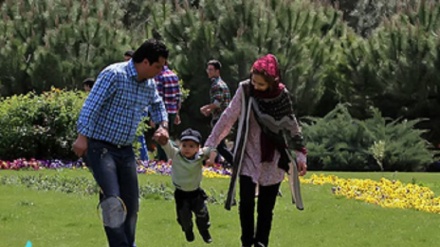Iranian Family (1)
Welcome to the first episode of the series Iranian Family. A glorious moment for establishment of a heavenly relationship has arrived. A couple wants to cover the path toward elevated goals, based on God's will and content. This is an important and deep-rooted agreement.
The Prophet of Islam, Mohammad (Blessings of God upon him and his progeny) considered marriage as his tradition; the path toward divine content; and a means to partly protect and safeguard the sacred religion of Islam.
Marriage, which is a divine tradition, is one of the Godly gifts and an inevitable phenomenon in the life of mankind. Undoubtedly, God, based on His prudence, has considered marriage an important value and choice. On this basis, the individual who doesn't get married has deprived himself of this significant value.
The contemporary world has turned into a global village, and in the age of communication, members of the communities resemble family members. In the meantime, there are still age-old phenomena, values, concepts, and establishments which mankind needs. Family is one of the most important establishments and units which the present day man needs. Today, we speak of the positive and beneficial aspects of Islamic families, and the characteristic traits of the Iranian families.
Family is the cornerstone of social life. In addition to the obligation of families for reproducing and child-rearing for the sake of survival of mankind, family maintains numerous other duties, such as economic production; embodiment of culture in family members; and contribution toward transference of social norms. The status and situation of each individual is relatively shaped by the social status of his family.
In the study of Iranian family, one realizes that family highly contributes to developments in the Iranian society, and collective and familial lives have always covered their especial path. Hence, Iran is in stark contrast to majority of communities round the world, which have experienced the downward spiral of the status of families.
A member of the academic board of Tehran University, Dr. Hamid-Reza Jalaipour, in accordance with a body of recent studies carried out on 300 families in Tehran Province, has reminded that the Iranian community is not collapsing and family is the most consolidated social unit in Iran, which is on the path of continuous growth and development.
Generally speaking; families, prior to entry to the current situation, went through a number of phases. In the first phase, family is a small unit, with a few functions, because parents maintain few responsibilities and limited functions. However, with the passage of time, and development of social life, the duties and functions of families have grown.
Researchers strongly believe that family is the first social unit, and other social units such as religion, politics, and economy are established and developed, emanating from families. Upon the development and expansion of social life, families turn into the center of majority of social, economic, and political activities, and all of the needs and demands of individuals are catered for, thanks to the decisive role of family. This marks the point in which extended families emerge.
The image of crowded Iranian families, mirrors extended families, which have been etched in the minds of many Iranians. These families extend further with the marriage of their adult children; with all of the family members continuing to live in their paternal home, far from any luxury, or anxiety.
In the extended, and multifunctional families, in addition to parents and their children, other relatives such as uncles, and grandparents also lived in the same house. In this type; families, in addition to being the center of social communications; were also the location of economic and political activities. The working units were organized with the pivotal role of families. In extended families, parents were the founding members of the family. Sons, grandchildren, and daughter-in-laws comply with parents' instructions, and if parents are no longer fit for taking care of families due to advanced age, their eldest son replaces his elderly parents. Daughters leave their paternal home upon marriage, and children oftentimes, select their father's job. Let's present an example of such families in parts of Iran.
Mr. Qasem has lived in one of the villages in the vicinity of city of Arak, for more than six decades. He is 75 years old, and has seven children. Two of his daughters have left their paternal home, upon marriage. He lives in a large house, in the company of his son, and daughter-in-laws. In order to make major decisions, the family members gather to contemplate and adopt the ultimate decision. Women in this family, support men in their work, and economic activities. Although part of the paternal home has been allocated for married adult children, the members of this extended family maintain their independence.
After the phase of extended family; the nuclear family takes shape. We will become familiar with this type of Iranian families, next week.
Happily married couples are the ones that appropriately understand each other. There is no sign of stubbornness in their relations, and their good emotional bond motivates and energizes them for continuation of their married life.
MR/ME


